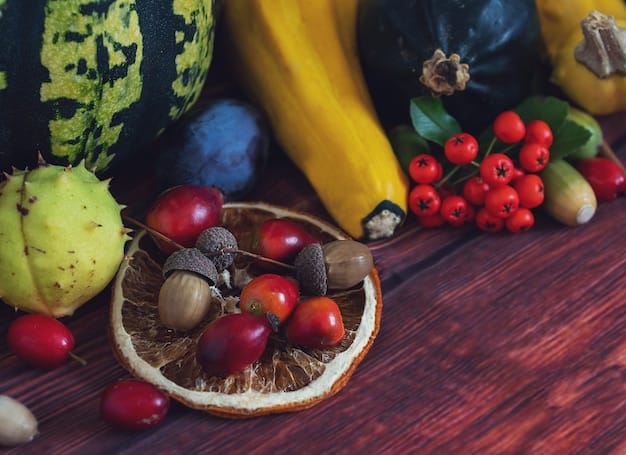Boost Your Health: The Latest on Antioxidant-Rich Foods

The Latest on Antioxidants: Which Foods Offer the Most Protection? Antioxidants are vital compounds that safeguard your cells from damage caused by free radicals, and incorporating antioxidant-rich foods into your diet is a powerful strategy for enhancing overall health and well-being.
Are you looking to boost your health and protect your body from damage? Discover the latest on antioxidants: which foods offer the most protection, and how they can improve your well-being.
Understanding Antioxidants: Your Body’s Defense System
Antioxidants are molecules that fight free radicals in your body. Free radicals are compounds that can damage cells, leading to illness and aging. By understanding how antioxidants work, you can make informed choices about your diet and lifestyle.
What Are Free Radicals?
Free radicals are unstable molecules that can damage cells, proteins, and DNA. They are a byproduct of normal metabolism and are also produced by external factors like pollution and smoking.
How Do Antioxidants Neutralize Free Radicals?
Antioxidants neutralize free radicals by donating an electron, stabilizing them and preventing them from causing damage. This process helps protect your cells and reduces the risk of chronic diseases.

Here are some key roles antioxidants play in maintaining health:
- Preventing Cellular Damage: Antioxidants protect cells from the oxidative stress caused by free radicals.
- Reducing Inflammation: Many antioxidants have anti-inflammatory properties that help reduce chronic inflammation in the body.
- Supporting Immune Function: Antioxidants boost the immune system by protecting immune cells from damage.
- Lowering Disease Risk: Consuming antioxidants regularly can lower the risk of chronic diseases like heart disease, cancer, and Alzheimer’s.
In summary, antioxidants are essential for protecting your body from the harmful effects of free radicals. By understanding their role, you can make informed choices to boost your health.
Top Antioxidant-Rich Foods: A Comprehensive Guide
Incorporating antioxidant-rich foods into your diet is one of the best ways to protect your health. There is a wide variety of delicious options available, each packed with unique benefits.
Berries: Nature’s Tiny Powerhouses
Berries such as blueberries, strawberries, and raspberries are loaded with antioxidants, particularly anthocyanins. These compounds give berries their vibrant colors and offer numerous health benefits.
Benefits of including berries in your diet:
- Blueberries: Known for their high antioxidant content, blueberries can improve brain health and reduce the risk of cognitive decline.
- Strawberries: Rich in vitamin C and antioxidants, strawberries support immune function and promote healthy skin.
- Raspberries: These berries contain ellagic acid, which has anti-cancer properties and can help protect against chronic diseases.
Dark Chocolate: A Delicious Way to Boost Antioxidants
Good news for chocolate lovers! Dark chocolate, especially varieties with a high cocoa content, is packed with antioxidants, including flavonoids and polyphenols.

When choosing dark chocolate, consider the following:
- Cocoa Content: Opt for dark chocolate with at least 70% cocoa content to maximize antioxidant benefits.
- Added Sugar: Choose varieties with low added sugar to avoid negating the health benefits.
- Serving Size: Enjoying dark chocolate in moderation is key to reaping its benefits without overdoing it on calories.
In short, berries and dark chocolate are excellent sources of antioxidants that can easily be incorporated into your daily diet, offering both health benefits and delicious flavors.
Vegetables Packed with Antioxidants: Beyond the Basics
While fruits often steal the spotlight, many vegetables are also excellent sources of antioxidants. These vegetables not only offer a wide array of vitamins and minerals but also provide powerful antioxidant protection.
Leafy Greens: A Nutritional Goldmine
Leafy greens like spinach, kale, and collard greens are rich in antioxidants such as beta-carotene, lutein, and zeaxanthin. These compounds are essential for protecting your eyes and reducing the risk of chronic diseases.
Benefits of adding leafy greens to your plate:
- Spinach: High in vitamins A and C, as well as antioxidants, spinach supports immune function and promotes healthy vision.
- Kale: This leafy green is packed with antioxidants and anti-inflammatory compounds, helping protect against chronic diseases.
- Collard Greens: A good source of vitamins K and C, collard greens support bone health and provide antioxidant protection.
Colorful Vegetables: A Rainbow of Antioxidants
Vegetables with vibrant colors, such as red cabbage, beets, and carrots, are also rich in antioxidants. These vegetables contain unique compounds that offer a range of health benefits.
When choosing colorful vegetables, consider the following:
- Red Cabbage: Contains anthocyanins, which have anti-inflammatory and anti-cancer properties.
- Beets: Rich in betalains, which help reduce inflammation and protect against oxidative stress.
- Carrots: High in beta-carotene, which is converted to vitamin A in the body and supports vision and immune function.
Ultimately, incorporating a variety of antioxidant-rich vegetables into your diet is crucial for maintaining optimal health. Leafy greens and colorful vegetables provide a wide range of vitamins, minerals, and antioxidants that can protect against chronic diseases and support overall well-being.
Nuts and Seeds: Small but Mighty Antioxidant Sources
Nuts and seeds are not only great sources of healthy fats and protein, but they also pack a significant antioxidant punch. Adding nuts and seeds to your diet can help protect your cells from damage and reduce the risk of chronic diseases.
Nuts: A Wealth of Antioxidants
Nuts like walnuts, pecans, and almonds are rich in antioxidants, including vitamin E, flavonoids, and phenolic acids. These compounds contribute to heart health and overall well-being.
Let’s explore the benefits of each nut:
- Walnuts: Contain high levels of antioxidants and omega-3 fatty acids, supporting brain health and reducing inflammation.
- Pecans: Rich in antioxidants like vitamin E and ellagic acid, pecans promote heart health and protect against oxidative stress.
- Almonds: A good source of vitamin E and flavonoids, almonds support skin health and provide antioxidant protection.
Seeds: Tiny Treasures of Antioxidant Power
Seeds such as flaxseeds, chia seeds, and sunflower seeds are also excellent sources of antioxidants. These seeds are packed with nutrients and offer a variety of health benefits.
When incorporating seeds into your diet, consider the following:
- Flaxseeds: Rich in lignans and omega-3 fatty acids, flaxseeds support heart health and have antioxidant properties.
- Chia Seeds: High in antioxidants, fiber, and omega-3 fatty acids, chia seeds promote digestive health and reduce inflammation.
- Sunflower Seeds: A good source of vitamin E and selenium, sunflower seeds support immune function and provide antioxidant protection.
All things considered, nuts and seeds are small but mighty sources of antioxidants that can easily be added to your daily diet. They offer a combination of healthy fats, protein, and antioxidants, making them a valuable addition to any health-conscious eating plan.
Spices and Herbs: Flavorful Antioxidant Boosters
Spices and herbs are not only essential for adding flavor to your dishes but also offer a significant boost of antioxidants. These natural ingredients can help protect your cells from damage and reduce the risk of chronic diseases.
Top Antioxidant-Rich Spices
Spices like turmeric, cinnamon, and ginger are loaded with antioxidants and have potent anti-inflammatory properties. Incorporating these spices into your cooking can enhance both the flavor and health benefits of your meals.
Benefits of using these spices regularly:
- Turmeric: Contains curcumin, a powerful antioxidant and anti-inflammatory compound that supports brain health and reduces the risk of chronic diseases.
- Cinnamon: Rich in antioxidants, cinnamon can help regulate blood sugar levels and reduce inflammation.
- Ginger: Known for its anti-inflammatory and antioxidant properties, ginger supports digestive health and reduces nausea.
Herbs with Antioxidant Power
Herbs such as oregano, parsley, and basil are also excellent sources of antioxidants. These herbs can be used fresh or dried to add flavor and health benefits to your dishes.
When selecting herbs, consider the following:
- Oregano: Contains high levels of antioxidants and has antibacterial properties, supporting immune function and protecting against infections.
- Parsley: Rich in vitamins A and C, as well as antioxidants, parsley supports immune function and promotes healthy skin.
- Basil: Contains antioxidants and has anti-inflammatory properties, helping protect against chronic diseases.
In summary, spices and herbs are flavorful and effective ways to boost your antioxidant intake. Turmeric, cinnamon, ginger, oregano, parsley, and basil each offer unique health benefits, making them valuable additions to your kitchen.
Lifestyle Factors That Enhance Antioxidant Protection
While diet plays a crucial role in antioxidant protection, various lifestyle factors can also significantly impact your body’s ability to combat free radicals and maintain optimal health.
The Importance of Regular Exercise
Regular physical activity boosts your body’s natural antioxidant defenses. Exercise increases blood flow and oxygen delivery to cells, which helps improve their ability to neutralize free radicals.
Benefits of regular exercise for antioxidant protection:
- Increased Antioxidant Enzyme Production: Exercise stimulates the production of antioxidant enzymes, enhancing the body’s natural defense system.
- Reduced Inflammation: Regular physical activity helps reduce chronic inflammation, which is a major contributor to free radical production.
- Improved Cardiovascular Health: Exercise improves heart health, reducing the risk of conditions that contribute to oxidative stress.
The Role of Stress Management
Chronic stress can increase the production of free radicals and deplete your body’s antioxidant reserves. Managing stress through relaxation techniques and mindfulness practices can help maintain a healthy balance.
Here are some effective stress management techniques:
- Mindfulness Meditation: Practicing mindfulness can help reduce stress levels and improve overall well-being.
- Yoga: Yoga combines physical activity with relaxation, helping reduce stress and improve flexibility.
- Deep Breathing Exercises: Taking deep breaths can help calm the nervous system and reduce stress levels.
Simply put, combining a diet rich in antioxidants with lifestyle habits like regular exercise and effective stress management can significantly enhance your body’s ability to combat free radicals and protect against chronic diseases.
| Key Point | Brief Description |
|---|---|
| 🫐 Berries | Rich in anthocyanins, which support brain health and reduce disease risk. |
| 🍫 Dark Chocolate | High in flavonoids and polyphenols, promoting heart health when consumed in moderation. |
| 🥬 Leafy Greens | Spinach and kale are packed with beta-carotene and lutein for eye and immune health. |
| 🌰 Nuts and Seeds | Walnuts and flaxseeds offer omega-3s and vitamin E for heart and brain support. |
FAQ
Antioxidants protect cells from damage caused by free radicals, reducing the risk of chronic diseases like heart disease and cancer. They also support immune function and reduce inflammation.
Include a variety of antioxidant-rich foods such as berries, leafy greens, nuts, and seeds in your daily meals. Use antioxidant-rich spices like turmeric and cinnamon in your cooking.
While antioxidants are beneficial, excessive intake through supplements can be harmful. Focus on obtaining antioxidants from a balanced diet rather than relying on high-dose supplements.
Yes, regular exercise can boost the body’s natural antioxidant defenses. It increases blood flow and oxygen delivery to cells, improving their ability to neutralize free radicals.
Lifestyle factors such as managing stress, avoiding smoking, and limiting exposure to pollutants can significantly enhance the body’s antioxidant protection. These habits support overall health.
Conclusion
Incorporating a variety of antioxidant-rich foods and healthy lifestyle habits into your routine is crucial for protecting your health and preventing chronic diseases. By making informed choices and prioritizing antioxidant protection, you can support your body’s natural defenses and boost your overall well-being.





